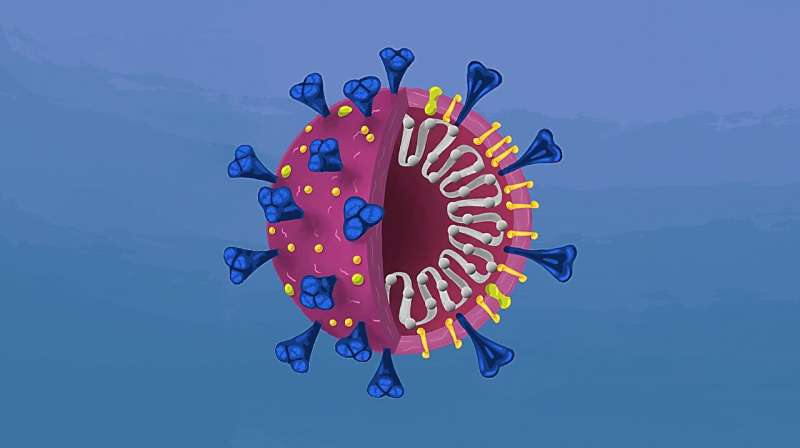This article has been reviewed according to Science X's editorial process and policies. Editors have highlighted the following attributes while ensuring the content's credibility:
fact-checked
trusted source
proofread
Scientists uncover COVID's weakness: Without key proteins, virus cannot infect people

New UC Riverside research has revealed COVID's Achilles heel—its dependence on key human proteins for its replication—which can be used to prevent the virus from making people sick.
In a paper published in the journal Viruses, the UCR research team describes an important discovery. The protein in COVID that enables the virus to make copies of itself, called N, requires the help of human cells to perform its job.
Genetic instructions in our cells are transcribed from DNA to messenger RNA, and then translated into proteins that enable functions such as growth and communication with other cells. Following this translation event, proteins often need additional modifications by enzymes. These so-called post-translation modifications ensure that proteins are uniquely suited to perform their intended tasks.
COVID takes advantage of a human post-translation process called SUMOylation, which directs the virus' N protein to the right location for packaging its genome after infecting human cells. Once in the right place, the protein can begin putting copies of its genes into new infectious virus particles, invading more of our cells, and making us sicker.
"In the wrong location, the virus cannot infect us," said Quanqing Zhang, co-author of the new study and manager of the proteomics core laboratory at UCR's Institute for Integrative Genome Biology.
Proteomics is the study of all the proteins that an organism makes, how they are modified by other enzymes, and the roles they play in a living organism. "If someone gets an infection, maybe one of his or her proteins will appear differently than it was before. That's what we're looking for in our facility," Zhang said.
In this case, the team designed and conducted experiments that made COVID proteins' post-translational modifications easy to see. "We used fluorescent glow to show us where the virus is interacting with human proteins and making new virions—infectious viral particles," said UCR bioengineering professor and corresponding paper author Jiayu Liao.
"This method is more sensitive than other techniques and gives us a more comprehensive view of all the interactions between the human and viral proteins," he said.
Using similar methods, the bioengineering team previously discovered that the two most common types of flu virus, Influenza A and Influenza B, require the same post-translational SUMOylation modification in order to replicate.
This paper shows that COVID depends on SUMOylation proteins, just as the flu does. Blocking access to the human proteins would allow our immune systems to kill the virus.
Currently the most effective treatment for COVID is Paxlovid, which inhibits virus replication. But patients need to take it within three days following infection. "If you take it after that it won't be so effective," Liao said. "A new medication based on this discovery would be useful to patients at all stages of infection."
The similarities between viruses may enable a whole new class of antiviral medication. With sufficient support, Liao estimates these can be developed within five years.
"I think other viruses might work this way as well," Liao said. "Ultimately, we would like to block the flu as well as COVID, and potentially other viruses such as RSV and Ebola. We are making new discoveries to help make this happen," Liao said.
More information: Vipul Madahar et al, Human Post-Translational SUMOylation Modification of SARS-CoV-2 Nucleocapsid Protein Enhances Its Interaction Affinity with Itself and Plays a Critical Role in Its Nuclear Translocation, Viruses (2023). DOI: 10.3390/v15071600




















